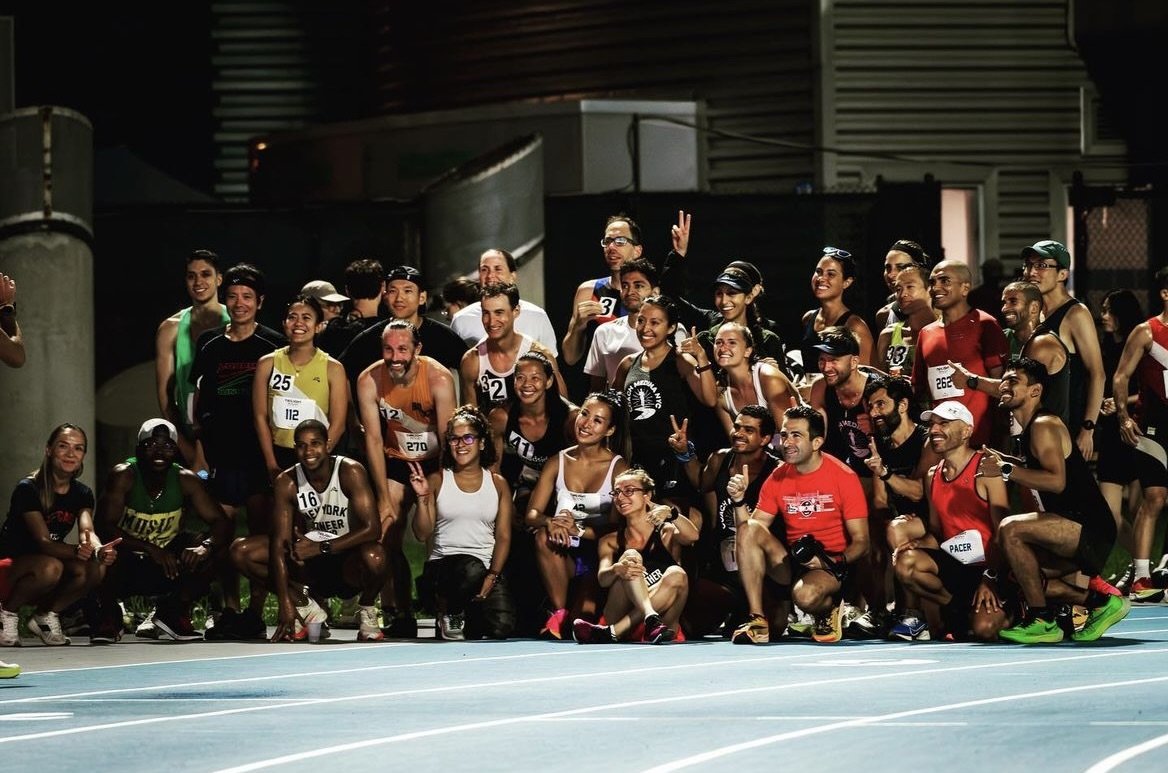5 Marathon Training Tips
Here I go Again!
I’m nearing the end of my third marathon training cycle, and the second of 2023.
Training for the Chicago Marathon with a goal to beat my personal record has been my most challenging ambition yet. Because even though I know how it feels to run 26.2 miles, I’ve never put so much into my preparation before.
I believe I’m a hard working person, and when I set my mind to something, I’m going to give it my best shot.
I grind, I focus, and I get through. But earlier this year when I ran the Tokyo Marathon, and came within 60 seconds of my finish time at the New York City Marathon, I became curious. Is this the best I can do?
And I decided.. maybe the third time is the charm!
Even though I have a lot more work do, I have learned so much through running the past few years. I figured I’d share that knowledge, even if just personal experience, with others who are either going at their goals along side me or considering running a race for the first time! While there is a tremendous amount of information out there, I can really boil it all down to these 5 effective tips for training. Read on!
Here’s The Tea…
Trust the Process, Follow A Plan
Go Faster Together
Prioritize Strength and Recovery
Invest in The Right Equipment
Believe in Yourself
1. Trust the Process, Follow A Plan!
Conditioning for a marathon doesn’t happen overnight. But as difficult as it is, it’s not impossible for anyone. Actually, one of the most amazing things about watching a marathon is seeing the physical challenges some of the participants overcome to do the race. It’s the most inspiring thing I’ve ever witnessed, as a runner or as a spectator, and it was part of my initial motivation to run one.
What I learned is that it takes one thing to run a marathon, and that’s discipline. If you trust the process, follow the plan, and stay consistent with your workouts… you are golden.
Picking The Right Training Plan
It’s important to scale your distance gradually over time, so I recommend following a 16 week plan or a 18 week plan. I personally follow a 16 week plan, and make sure I can run about 6 miles comfortably before I hit week 1 so I have a foundation to work off of. That makes the early days of training less of a struggle!
Another misconception is that if you can do your long distance runs, you can do the race. But it’s really critical to get your legs used to running on sore legs, or else that marathon is going to HURT extra. A good way to do this is increase your weekly mileage across the course of the plan. I usually increase to about 50 miles in peak training, but this season I’m trying to work up to 60 miles.
Ready to get started? You can either find a plan online (there are tons out there for free!) or you can do what I did the last few months and commit to working with a coach.
Coaching Programs
Are you the type of person who needs a little more motivation, support, or are looking for a personalized plan to elevate your training? I would definitely recommend this then!
Every program looks different, and selection should be based off of what you need. Consider the factors that are most important to you!
Do you want 1:1 coaching, or join a team?
Do you need convenience and flexibility, or accountability and structure?
Virtual training or in person sessions?
Even though I’m still a few weeks away from my race, I can say I’ve seen the impact that a great program and experienced coaching can make. Working with Coach Medina has been incredible.
It’s a marathon training program right here in the city that features in-person coaching sessions twice a week. My plan is based on my individual goals and ability, but I’m a part of a larger group of athletes and run with a similar paced group.
While I love the in person assessment, coaching and encouragement, I also love the flexibility and digital aspect. The schedule is administered through a mobile app, pushed to me automatically and tailored for the goals of my pace group. I can send workouts to my watch and the Garmin records my progress and compliance with the training plan. It’s all so well organized! And it’s keeping me on track.
Commitment and Sacrifice
Commitment is a big word. To simplify:
Determine your plan
Stick with it
It doesn’t need to be comfortable.. the time, the place, the weather… it’s often uncomfortable if I’m honest (especially this summer). But the important thing is to get in the miles. Even just a few are better than nothing!
Now I get that this is a sacrifice. I have a busy job and a travel business I run here in addition to my blog. It can get hard to juggle these things, rest, and manage my stress. I have a husband who I love, and waits for me to come home - and I hate to make him feel deprioritized to my running schedule. And I’m lucky to have family and friends, who I miss a lot, and who I try to keep my commitments to when I’ve made plans with them.
It’s often early mornings, late nights, and passing out on the couch after I eat and shower. In a training plan that requires 16 to 20 hours in a week, more time is spent with my running clubs than with my close circle.
What I’m saying is it can be difficult to make sacrifices for running. But on the reverse, it also helps to have a support system who believes in you, keeps you motivated, and understands that you’ve made a commitment too. When it gets hard, this is when your people can step in and encourage you to keep going!
Flexibility
This summer was a little more challenging than usual since I had many weekend plans committed to before I even joined my training program. Here is what I realized: It’s not realistic to be 100% compliant with a plan, life happens.
But if you set your intentions to run, then try your best to stick to the plan or make up for the miles elsewhere during the week. I flex my running days as needed based on how my body feels, bad weather, or scheduling conflicts… but I try to get it done.
Flexibility helps you to stay committed.
Giving yourself grace helps you stay confident.
2. Go Faster… Together
Guys, running clubs rock. Somehow I keep finding more and more? And they are all so lovely, welcoming, and help me make the time spent running pass more enjoyably.
Right now I only have the capacity to juggle 2-4 running clubs locally, but who knows, maybe next I’ll join a book club or a wine club or something?
But seriously, here is why I encourage running with others during marathon training:
I have learned so much from the more experienced runners around me, and joined such a great community over the years of running with Paragon Sports Run Club
Different clubs use different courses and workouts, so I can keep things fresh! For example, layering in some elevation in Central Park with As Is Run Club on Mondays
I feel like I’m part of a team, and not just going at this journey alone. Especially at the track with Coach Medina when we work together to keep pace on the 40th lap around the track.
Plus - let’s face it. Runners love to talk about running. I’m not sure if other hobbies are the same way… but it’s almost like that scene in Mean Girls where Lindsay Lohan is just waiting for people around her to bring up Regina George… I’m always down for chat about running.
So I love that I’m often surrounded by a group of like minded goal-oriented runners obsessed with this sport too.
You belong here.
At first I didn’t think I was a serious enough runner to commit to a coaching program like Coach Medina. I was completing my goals by finishing a few of the World Major races under 4 hours… did I really need to add more stress and commitment to my plate?
But a few of my running friends convinced me to join them this season, and I thought, what do I have to lose?
I thought I would be the slowest in the pack for sure… the inexperienced new girl. I was nervous day 1! But the group welcomed me so warmly from the very beginning.
These strangers became my teammates, who became my supporters, and my friends. From encouragement during the workout, to kudos on Strava, group chats on IG to keep us sane… to sharing sweets, bandaids, extra gels and warm clothes.
It’s actually crazy how experiencing a challenge like this together, working through it and motivating one another can make you grow so much. I’ve worked my way up in pace groups and I’m getting faster and more confident each week. Now I’m out here running 5k races and recruiting others to join the next cycle.
#Fastertogether !!
3. Prioritize Strength, Rest, and Recovery
I can’t stress enough how important this one is.
Strength training strengthens the muscles you use for running, and the ones you don’t use as much, to help protect your body from injury. While strength training is not as enjoyable for me, I use it as a time to do the following:
Slow down and stretch really well
Go indoors on days where the weather doesn’t cooperate
Build up my muscle with weighted workouts
When I trained for my first marathon in 2021, I knew it would be hard work, but I had never been as sore in my life as my first few long runs. I liked the idea of cross training as a way to give my legs a break and change up my routine. But during that cycle, and being new to the sport, I don’t think I pushed my weekly mileage past 40-45 miles a week. I often substituted runs with cycling, yoga, and other workouts. But I was lucky to be feeling healthy overall, and pushed through the training as planned.
But this winter I got shin splints for the first time. And I’ve been battling them for months, classic overuse. If I was going to run Chicago I needed more support.
I went to an Orthopedic in July who cleared me to run, no stress fracture. But I was recommended to try physical therapy, and began sessions twice a week with a therapist who is working to strengthen not only my calves, but my glutes, ankles, and hamstrings so I can find relief from pain and injury. Regular PT has made the greatest impact next to my coaching program.
4. Invest In The Right Equipment
High performance can be linked to high quality gear and equipment. It’s not necessary, but I can say it makes a difference for me! And that includes taking care of myself with the right preparation before, during, and after a run.
Before a run:
I usually dress in products by running brands I trust, and specialize in running and women’s shorts and tops from companies like New Balance or Nike
Shoes are key. I lace up with a few different types of shoes for training, but I like to race in my Nike Zoom X Vaporfly 2 - this Fall I’ll be training in my Nike Alphafly 2 !!
The wrong footwear or using worn out shoes can result in blisters, shin splints, and worse injuries. After 300 miles your shoes are technically ready to be retired.
I hydrate with Maurten Drink Mix (caf or regular)
I apply KT Chase Safe Gel Stick to help with chafing burns along my sports bra and underarms
During a run:
On a hot run I’ll carry along a small bottle of water or Gatorade.
Every 4 miles I eat a Maurten Gel 100 (usually 1 caf and 3 regular)
I always run with my Goodr Polarized Sunglasses
After a run:
I use my Theragun to help relieve my sore muscles
I know this sounds a little overwhelming. I always thought running was a cheap hobby! It’s free to run outside right? But when you add up the fancy shoes, the clothes to run in winter, the clothes to run in the summer, the gym fees, the coaching programs, and the race fees… it’s not so inexpensive.
5. Believe In Yourself
While everything I’ve shared can be useful, I think this last tip is the most important.
You have to believe you can do this. Years ago, I never thought I could run a marathon… let alone be crazy enough to do a second one. I didn’t think I had the right body type, had bad knees and ankles that were injured before, and I didn’t think I was fit enough.
But once I started training, I realized it’s very much mind over matter. Once I decided to get out of my own way, and mentally support my ambition, I started actually feeling more physically capable too. With practice, I feel stronger and more confident during my long runs on the weekends.
In case you aren’t feeling this way about yourself, I hope you know that you can run a marathon. You are strong, you can do hard things, and you are capable of doing this. You really just have to believe you can do it :)
So there you have it! My approach to marathon training, and what I keep in mind to stay on track. While there are many ways to prepare for a marathon, these are just a few tips I find valuable.
Now I’m obviously not a coach, a physical therapist, a trainer, or an elite athlete. I’m just an average runner. Passionate about this hobby and hungry for a PR.
In less than 30 days I’ll be back out there to take on my third marathon in Chicago. Good luck to anyone else who is currently training for a marathon this Fall! I hope you find these tips helpful.
Xx
Gab























